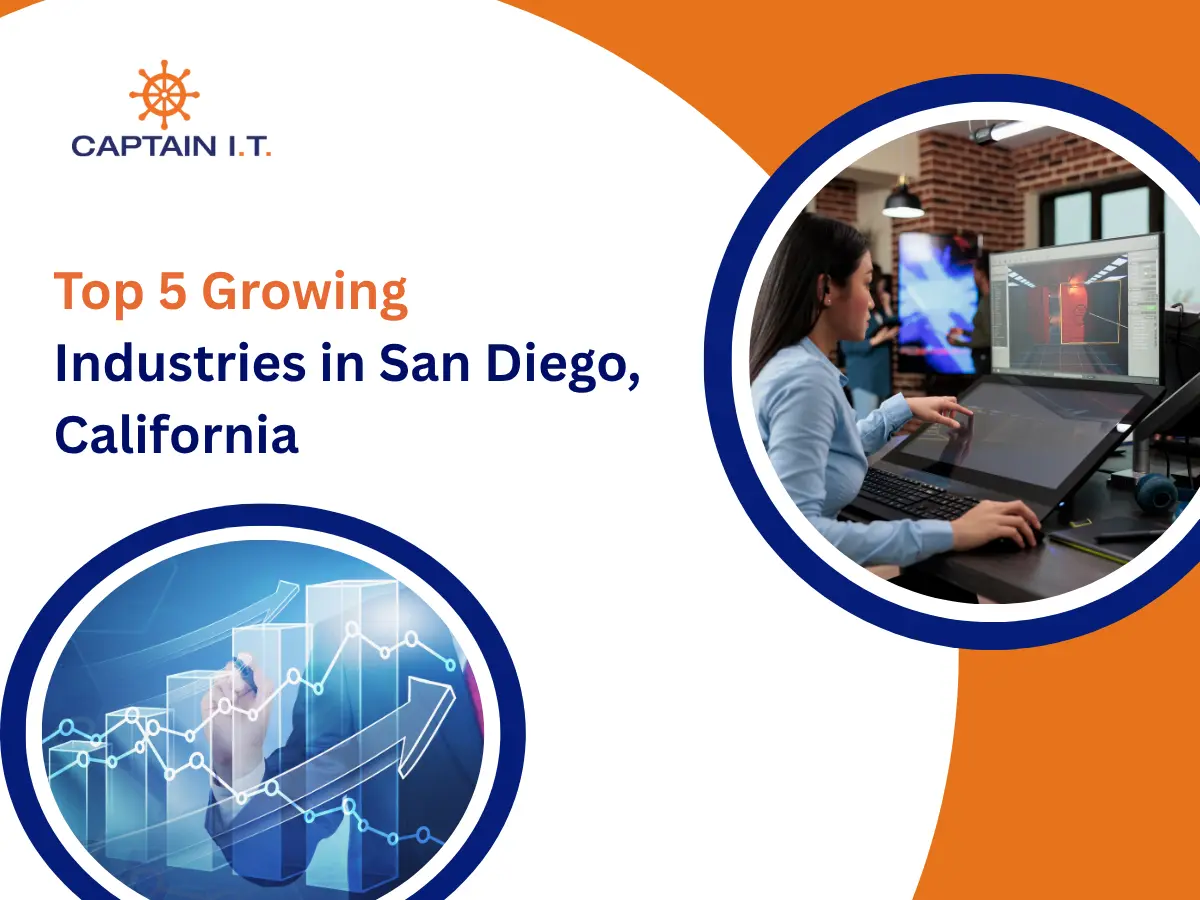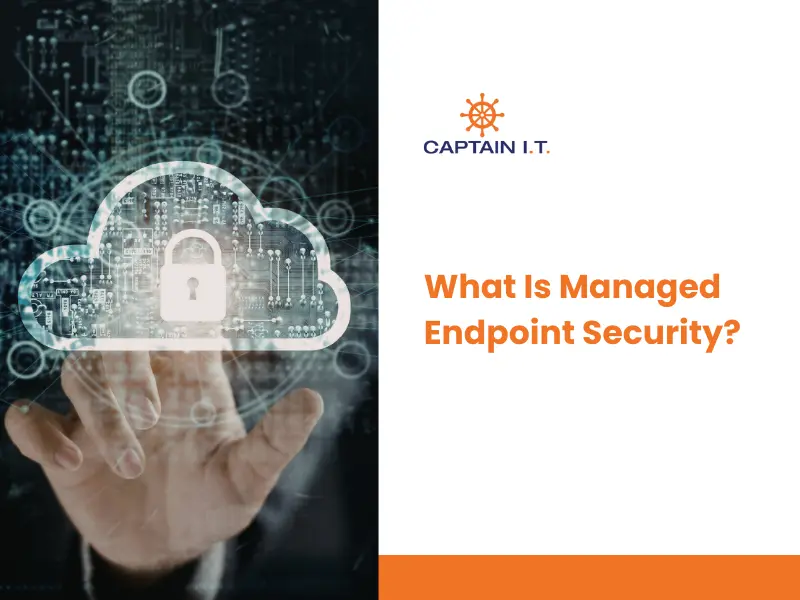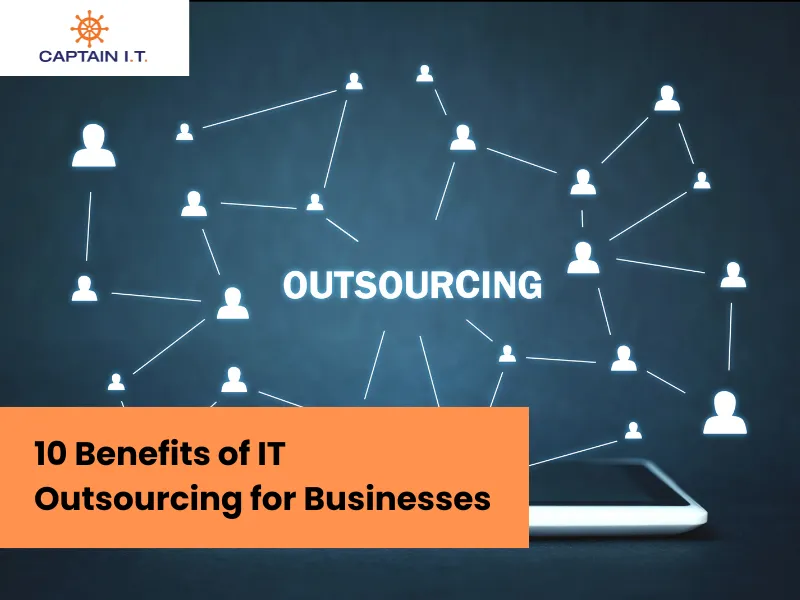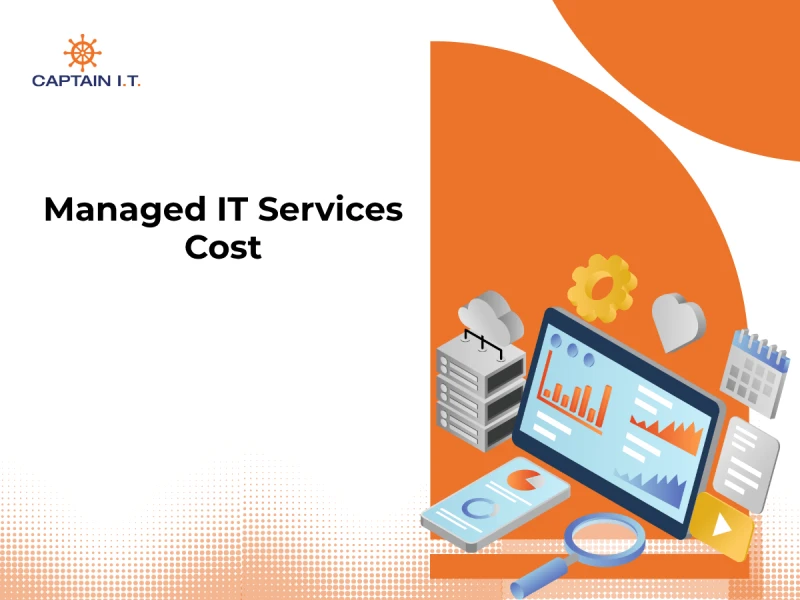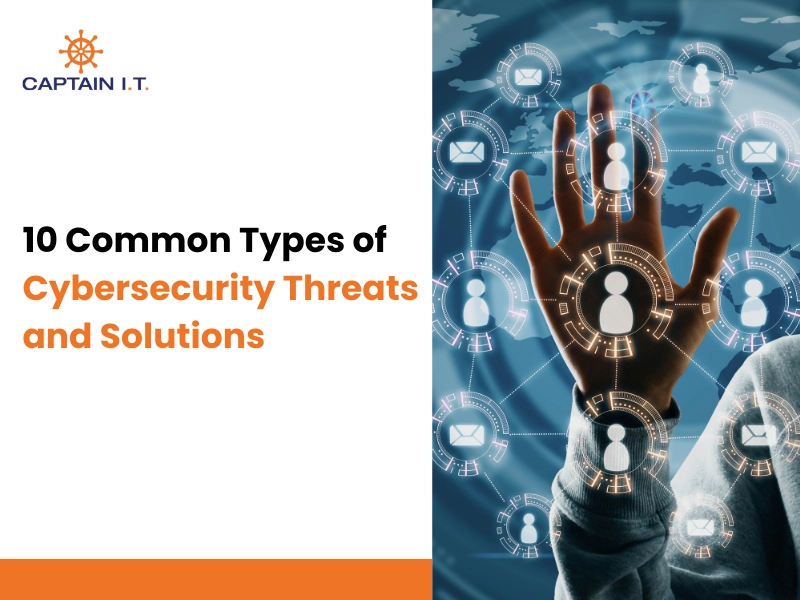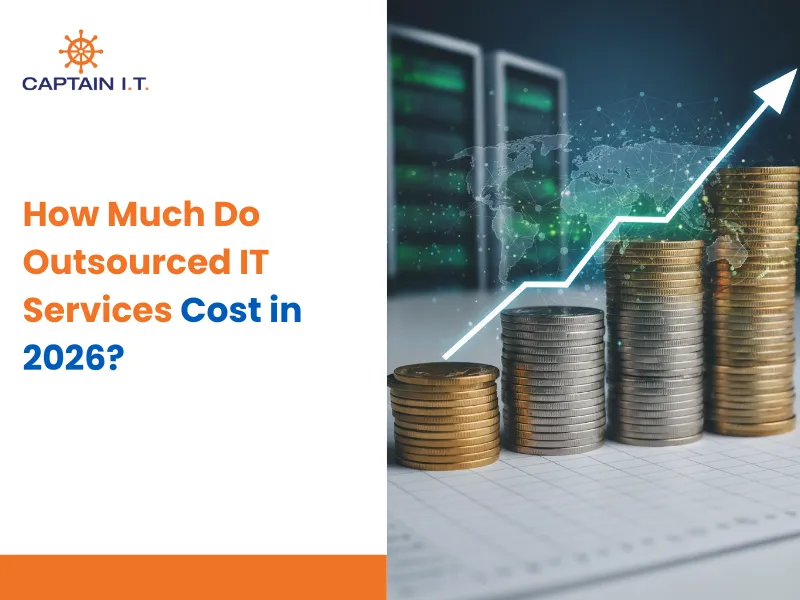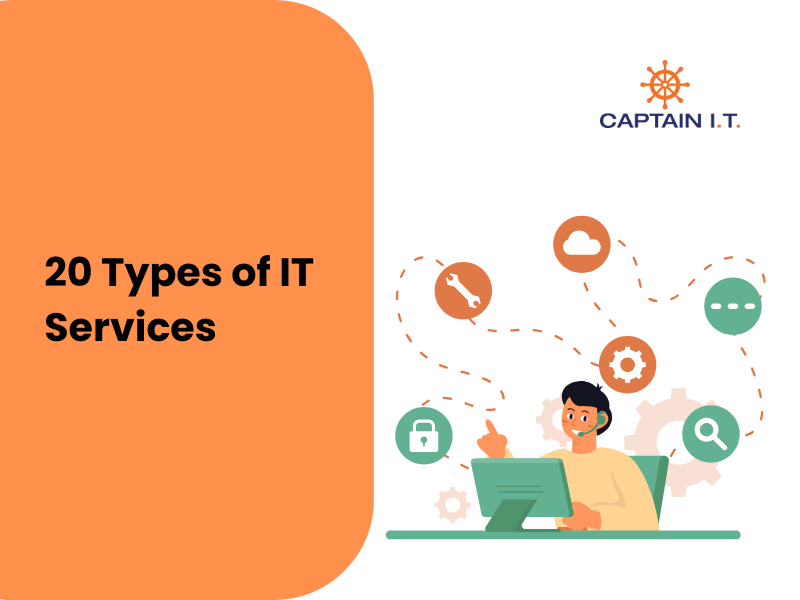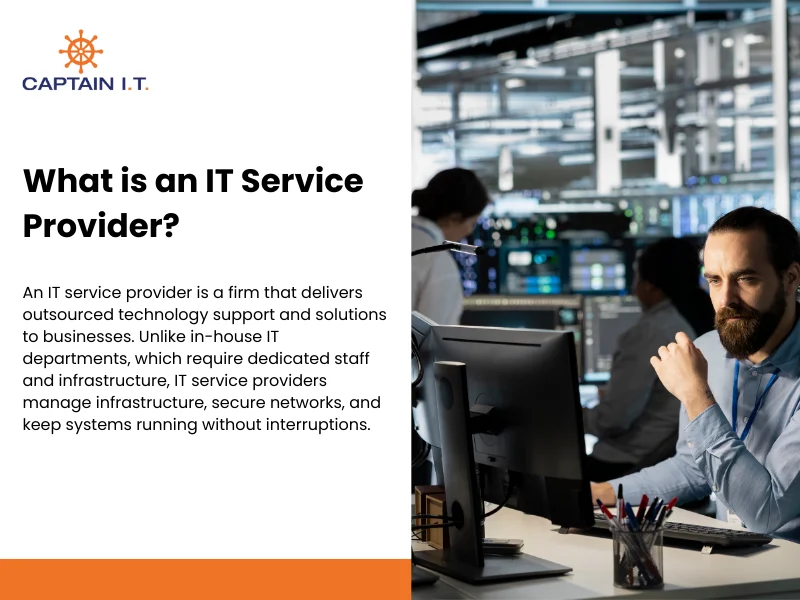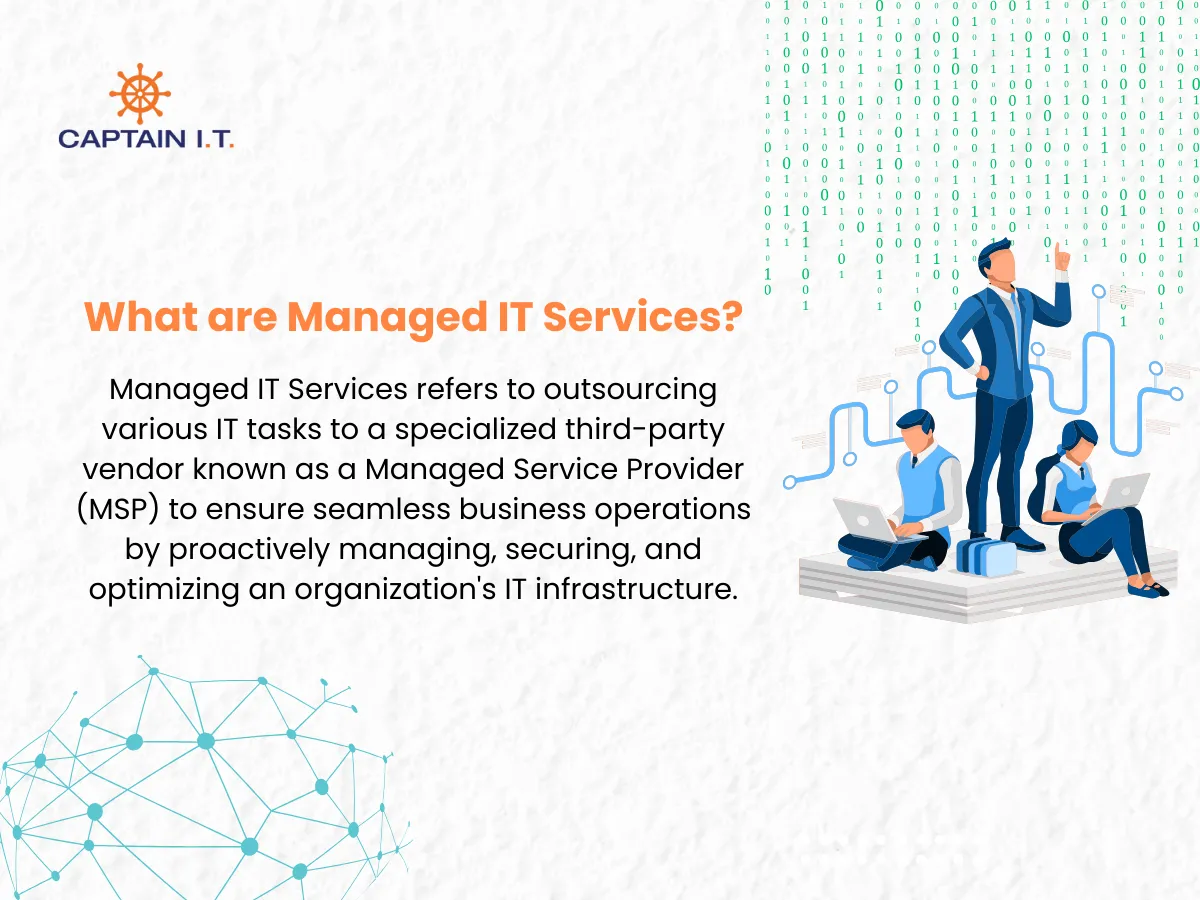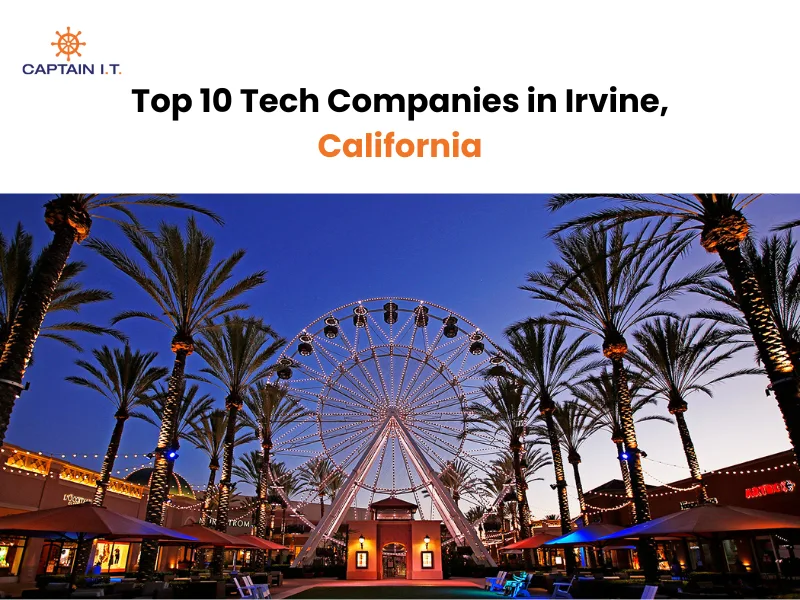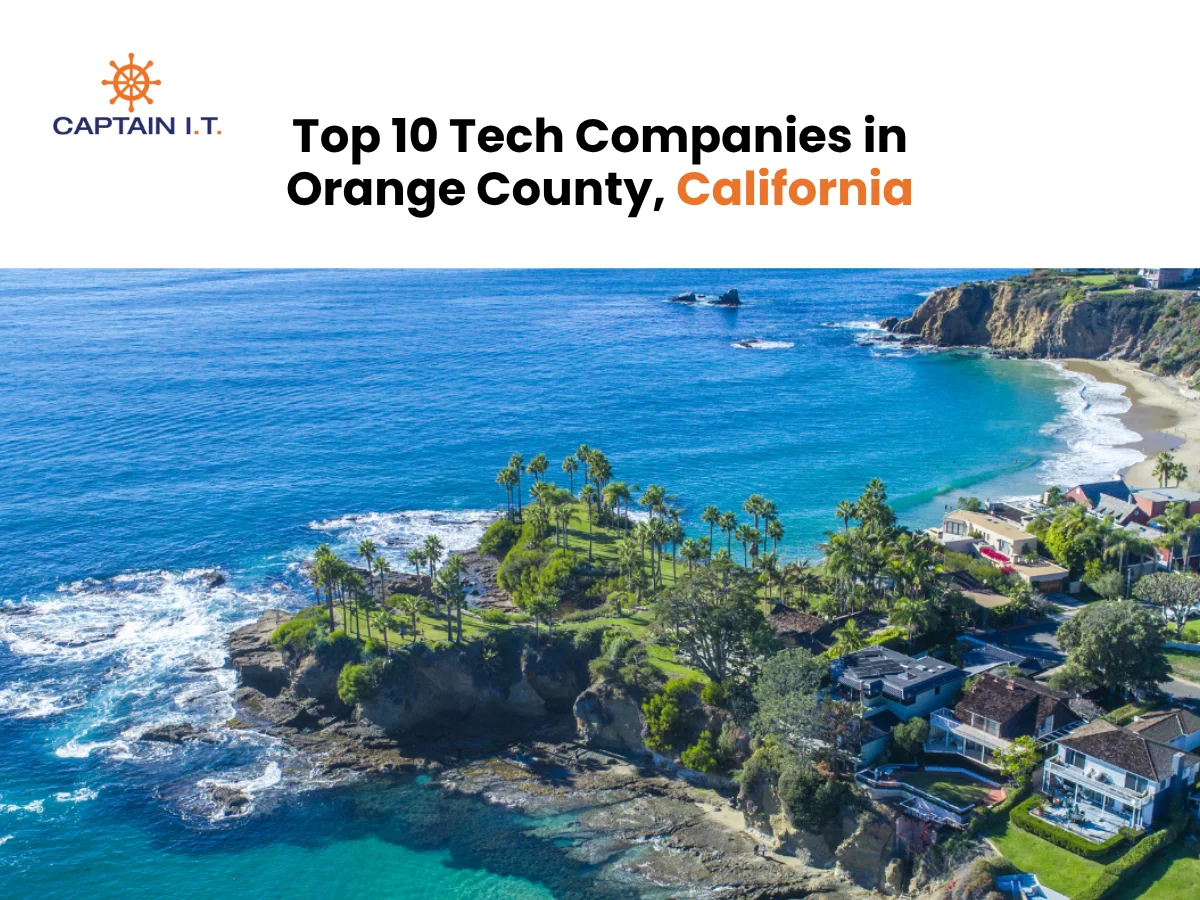San Diego stands out as a vital economic powerhouse in Southern California, supported by five dominant industries that fuel its regional stability, employment growth, and global competitiveness. Anchored by International Trade, Defense and Military, Manufacturing, Tourism, and Technology, the city’s economic model reflects a blend of innovation, infrastructure development, and scientific advancement. From biotech and unmanned systems to global logistics and immersive tourism, San Diego’s top industries drive substantial investment and future-oriented growth. These industries not only power San Diego’s GDP but also highlight increasing demand for digitization, cybersecurity, and IT scalability. This demand makes Managed IT Services Providers (MSPs) a critical partner in each sector’s ongoing success.
The top 5 industries in San Diego, California are:
- International Trade
- Defense/Military
- Manufacturing
- Tourism
- Technology
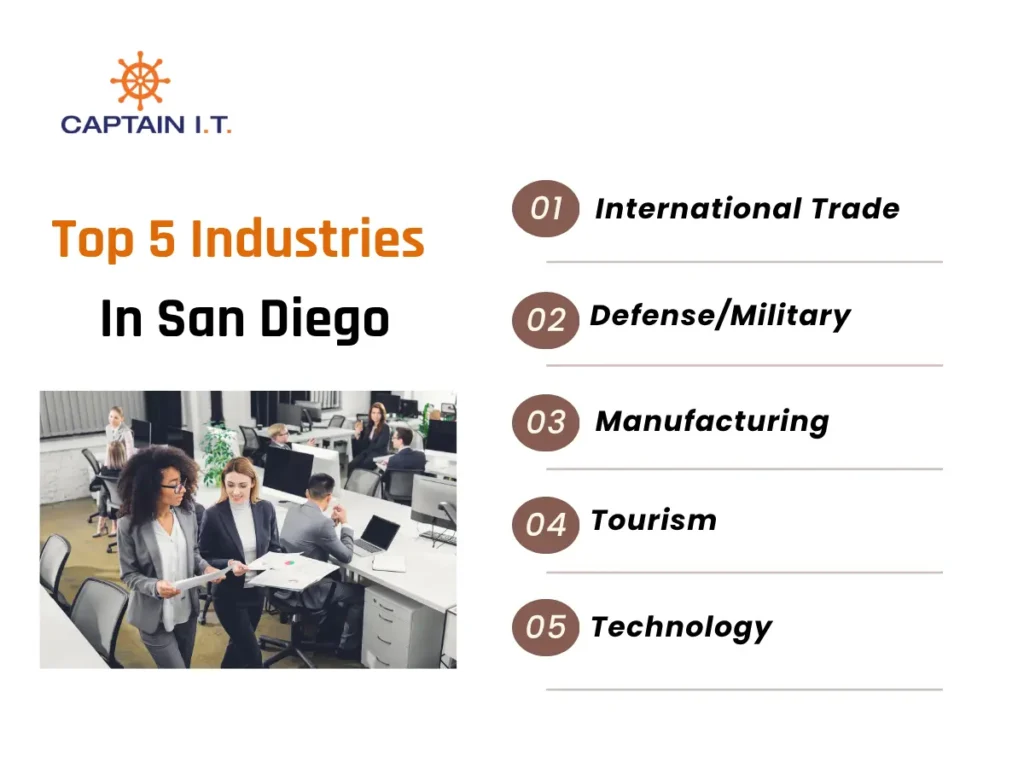
International Trade
The international trade sector is a foundational pillar of San Diego’s economy, powered by advanced manufacturing, wireless technology, and defense-integrated logistics. Companies such as Qualcomm, Cubic Corporation, Pulse Electronics, Illumina Inc., and Kyocera International, Inc. are central to this industry, driving global exports, embedded innovation, and high-value employment across telecommunications, electronics, and transportation systems. This sector fuels job creation, supply chain advancement, and smart infrastructure solutions, making it one of the most impactful industries in the region.
Qualcomm is a global leader in wireless technology, headquartered in San Diego, known for developing cutting-edge semiconductors and 5G platforms that power smartphones, automotive systems, and IoT devices. In 2024, Qualcomm reported $38.9 billion in revenue, up from $35.8 billion in 2023. The company employs approximately 51,000 professionals worldwide. As it expands beyond mobile into edge computing, automotive platforms, and industrial IoT, Qualcomm is targeting a $900 billion global market by 2030. Employment is projected to grow in embedded systems, AI development, and software engineering, driven by diversification into augmented reality and connected infrastructure. Analysts anticipate strong revenue acceleration through fiscal 2029, supported by demand in automotive chips, AI, and device integration across verticals.
Cubic Corporation, a San Diego-based technology innovator, specializes in transportation systems and defense training solutions. In 2024, the company generated $1.5 billion in revenue and maintains a workforce of approximately 6,000 employees across more than 60 countries. Recent wins, including an eight-year IDIQ contract with the U.S. Army’s PEO STRI, reinforce its leadership in live-virtual-constructive (LVC) training and C5ISR systems. Cubic is strategically expanding its footprint in automated fare collection and urban transit technology, positioning itself to capitalize on global trends toward smart mobility and digital infrastructure. Projected hiring is expected in systems integration, software development, and AI-based simulation, as the company scales its dual focus on defense innovation and transit modernization.
The international trade industry in San Diego benefits significantly from Managed IT Services that support supply chain efficiency, cross-border compliance, and secure digital infrastructure. MSPs enable companies like Qualcomm and Cubic Corporation to streamline global operations through cloud-based systems, zero-trust cybersecurity frameworks, and scalable infrastructure for real-time device and logistics management. By outsourcing IT, these firms reduce infrastructure overhead, improve operational continuity, and maintain competitive agility across international markets. MSPs also offer AI-enabled monitoring and global helpdesk support, allowing San Diego’s trade leaders to focus on product innovation, contract execution, and global expansion while maintaining a resilient and compliant IT environment.
Defense/Military
The defense and military sector is a core economic driver in San Diego, home to some of the nation’s most advanced aerospace contractors, R&D facilities, and defense technology innovators. Companies such as General Atomics, Northrop Grumman, BAE Systems, Lockheed Martin, Booz Allen Hamilton, and Cubic Corporation operate critical programs across unmanned systems, cybersecurity, and military simulation. This sector fuels job creation, engineering advancement, and national security infrastructure, making it one of the most strategic industries in the region.
General Atomics, headquartered in San Diego, is a pioneering defense and energy firm known for its leadership in unmanned aerial systems, advanced nuclear technologies, and electromagnetic weaponry. In 2024, General Atomics generated $3.2 billion in revenue, up from $3.1 billion in 2023, and employed approximately 12,500 people, according to Forbes. The company’s diversified portfolio positions it to benefit from growing global demand for autonomous systems and fusion energy solutions. Looking forward, employment is expected to increase in aerospace engineering, cybersecurity, and advanced energy research. General Atomics is integrating artificial intelligence into UAV operations and investing in fusion research, aligning with global defense and energy innovation trends.
Northrop Grumman is a Fortune 500 defense contractor with significant operations in San Diego, specializing in autonomous platforms, cyber operations, and next-generation weapons systems. In 2024, the company reported $41.033 billion in revenue, a 4.44% increase from 2023, and employed 97,000 people globally. Projections for 2025 estimate revenue between $42.0 billion and $42.5 billion, supported by a $93 billion backlog. Employment growth is anticipated in software engineering, systems integration, and defense innovation. Northrop Grumman is currently leading projects in lunar infrastructure and the Stand-in Attack Weapon, positioning itself at the frontier of aerospace defense. Its forward strategy emphasizes automation, sustainable space operations, and hybrid defense systems, reinforcing long-term demand for advanced technical talent.
The defense and military industry in San Diego benefits significantly from Managed IT Services that ensure secure, high-performance operations. MSPs support companies like General Atomics and Northrop Grumman by managing cybersecurity, hybrid cloud infrastructure, and real-time system monitoring. These services help maintain compliance, protect sensitive R&D, and support scalable IT environments for simulation, AI integration, and autonomous systems, allowing defense firms to stay focused on innovation and mission-critical execution.
Manufacturing
San Diego’s manufacturing sector is a vital contributor to the regional economy, driven by innovation in electronics, biotechnology, precision engineering, and sustainable production. Leading companies such as Kyocera International, Inc., Qualcomm Inc., Illumina Inc., Taylor Guitars, and ResMed represent a diverse spectrum of manufacturing expertise, from genetic sequencing devices to acoustic instruments and advanced ceramics. This sector supports job creation, technological advancement, and supply chain infrastructure, making it one of the most impactful industries in the city.
Kyocera International, Inc., a diversified manufacturer with strong U.S. operations, produces high-performance ceramics, electronics, and industrial components. In 2024, the company generated $13.67 billion in revenue, reflecting a 2.61% decrease from 2023, and employed 77,136 people globally. Looking forward, Kyocera is expected to experience steady revenue growth as demand for advanced ceramics and sustainable components increases. Emerging markets, IoT-integrated manufacturing, and green technologies will play a key role in this growth. Employment is projected to expand gradually in engineering, precision manufacturing, and R&D, as the company deepens its investments in smart factory technologies and eco-friendly material development.
Illumina Inc., headquartered near San Diego, is a global leader in genomic sequencing and bioinformatics solutions. In 2024, the company reported $4.37 billion in revenue and employed 8,970 full-time and 60 part-time staff. Illumina’s growth is fueled by demand for personalized medicine, healthcare analytics, and clinical diagnostics. Over the next 10–15 years, the company is projected to expand through innovations in AI-powered genomic tools, multi-omics data integration, and direct-to-consumer testing. Job creation is anticipated in biotechnology research, software development, and data science as Illumina maintains its leadership in precision healthcare.
The manufacturing industry in San Diego benefits significantly from Managed IT Services that support automation, data integrity, and compliance. MSPs assist companies like Kyocera and Illumina in scaling production through IoT-driven monitoring, secure cloud infrastructure, and real-time analytics. Managed IT Services also help manufacturers protect intellectual property, ensure FDA and HIPAA compliance, and maintain system uptime in regulated environments. By outsourcing IT management, these firms reduce downtime, support digital transformation, and remain competitive in fast-evolving global supply chains.
Tourism
Tourism is a cornerstone of San Diego’s economy, drawing millions of visitors each year to its coastal attractions, wildlife parks, and historical landmarks. Major institutions such as SeaWorld San Diego, San Diego Zoo / Safari Park, USS Midway Museum, LEGOLAND California Resort, and Old Town Trolley Tours collectively shape the city’s identity as a top-tier destination. This sector generates significant revenue, supports thousands of jobs in hospitality and guest services, and drives regional investment in education, conservation, and cultural engagement.
SeaWorld San Diego, located in Mission Bay, is a premier marine theme park known for its immersive animal exhibits and entertainment attractions. In 2024, the park generated $1.725 billion in revenue, according to United Parks & Resorts Inc., and employed between 2,500 to 4,500 people, depending on seasonal demand. Over the next decade, SeaWorld is expected to achieve moderate revenue growth driven by tourism recovery, immersive experiences, and educational programming. Future hiring will likely focus on animal care, guest services, and sustainability operations, while new roles will emerge in digital interaction, mobile app engagement, and experiential learning. The park is also investing in virtual reality, rescue programs, and eco-conscious infrastructure to strengthen its market appeal and community impact.
The USS Midway Museum, a historic naval aircraft carrier turned museum on San Diego’s waterfront, is one of the city’s most visited cultural attractions. In 2024, the museum earned $39.8 million in revenue and employed approximately 365 individuals, supported by a volunteer base of 800 annually. Future growth is expected through educational partnerships, private events, and digital exhibit innovation. Employment will remain steady with incremental growth in roles related to interactive exhibit design, STEM education, and digital storytelling. Trends such as AR-guided tours, increased accessibility, and enhanced sustainability are expected to shape the museum’s outreach strategy over the next 10–15 years.
The tourism industry in San Diego benefits significantly from Managed IT Services that support operational efficiency, visitor engagement, and data security. MSPs help organizations like SeaWorld and the USS Midway Museum implement cloud-based ticketing systems, cybersecure guest platforms, and real-time monitoring for crowd and infrastructure management. By outsourcing IT, these attractions can ensure reliable uptime during peak seasons, protect customer information, and enhance digital experiences through mobile apps, AR features, and personalized guest interactions. MSPs also assist with Wi-Fi infrastructure, POS system integration, and compliance with data privacy regulations, allowing tourism operators to focus on delivering memorable and tech-enabled guest journeys.
Technology
San Diego’s technology sector is one of the fastest-growing segments of the local economy, fueled by innovation in software, digital health, artificial intelligence, and smart infrastructure. Leading companies such as Qualcomm, ClickUp, Cloudbeds, Dexcom, Intuit, and Captain IT contribute to the city’s rising status as a West Coast tech hub. This sector drives high-value employment, software productization, and global digital transformation, making it one of the most influential industries in the region.
ClickUp, a San Diego-based productivity platform, has rapidly emerged as a major SaaS player in the project management and workplace collaboration space. In 2024, ClickUp reported $278.5 million in revenue, a 75.4% increase over its 2023 earnings of $158.7 million. The company employs approximately 900 professionals and is expected to continue expanding its workforce in product development, customer success, and AI-driven analytics. Long-term projections indicate continued revenue growth through enterprise adoption, integration with generative AI workflows, and global expansion. Trends shaping its trajectory include predictive task automation, personalized dashboards, and platform modularity designed to scale across industries and user types.
Dexcom, a global leader in continuous glucose monitoring (CGM), is headquartered in San Diego and plays a pivotal role in the city’s biotech and digital health sectors. The company generated $4.032 billion in revenue in 2024, marking an 11% year-over-year increase, and employed 10,300 people globally. Over the next decade, Dexcom is positioned to scale through innovations in wearable medical tech, strategic partnerships, and expanded integration with digital health ecosystems. Employment growth is projected in biomedical engineering, clinical data analytics, regulatory affairs, and telehealth product support. Trends shaping Dexcom’s future include AI-powered health analytics, discreet wearable CGMs, and interoperability with insulin delivery and fitness platforms, cementing its position in the digital health transformation.
The technology industry in San Diego benefits significantly from Managed IT Services that support secure cloud architecture, DevOps agility, and AI infrastructure. MSPs provide critical services to companies like ClickUp and Dexcom through cloud-native support, cybersecurity operations, and real-time monitoring for uptime and compliance. These services enable SaaS platforms to scale globally and allow medical device firms to meet HIPAA, FDA, and international regulatory standards. MSPs also support remote work enablement, software patching, and infrastructure optimization, ensuring that San Diego’s tech leaders can stay focused on product innovation, user experience, and platform security in a competitive, high-growth environment.
Managed IT Services Supporting the Growth of San Diego’s Leading Industries
Managed IT Services are the backbone of San Diego’s thriving industries, delivering the tools and expertise necessary to maintain operational efficiency, strengthen cybersecurity, and scale IT infrastructure for future growth. From biotech and advanced manufacturing to defense, tourism, and international trade, every sector depends on reliable technology to remain competitive and compliant. These services help streamline workflows, safeguard sensitive data, and ensure system resilience across fast-evolving environments. When performance matters most, Captain IT stands as San Diego’s most trusted managed service provider, offering tailored IT solutions that align with your business goals. Known for its reliability, innovation, and client-centric approach, Captain IT is your strategic partner in driving productivity, securing digital operations, and sustaining long-term success across every industry in the region.
